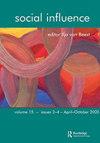网络互动中的道德从众:理性辩护增加同伴意见对道德判断的影响
IF 0.6
3区 心理学
Q3 PSYCHOLOGY, SOCIAL
引用次数: 16
摘要
在过去的十年中,社交媒体越来越多地被用作政治和道德话语的平台。我们调查是否从众,特别是关于道德态度,发生在这些虚拟环境除了面对面的互动。参与者参加了一项在线调查,并看到了有关某些反应频率的统计信息,就像人们可能在社交媒体上看到的那样(研究1),或者以理性或情感的方式为这些反应辩护的论点(研究2)。我们的结果表明,即使在非个人的数字环境中,社会信息也会影响道德判断。此外,理性的论证比情绪化的论证更能使人顺从。我们讨论了这些结果对优先考虑情绪反应的道德判断理论的影响。本文章由计算机程序翻译,如有差异,请以英文原文为准。
Moral conformity in online interactions: rational justifications increase influence of peer opinions on moral judgments
Abstract Over the last decade, social media has increasingly been used as a platform for political and moral discourse. We investigate whether conformity, specifically concerning moral attitudes, occurs in these virtual environments apart from face-to-face interactions. Participants took an online survey and saw either statistical information about the frequency of certain responses, as one might see on social media (Study 1), or arguments that defend the responses in either a rational or emotional way (Study 2). Our results show that social information shaped moral judgments, even in an impersonal digital setting. Furthermore, rational arguments were more effective at eliciting conformity than emotional arguments. We discuss the implications of these results for theories of moral judgment that prioritize emotional responses.
求助全文
通过发布文献求助,成功后即可免费获取论文全文。
去求助
来源期刊

Social Influence
PSYCHOLOGY, SOCIAL-
CiteScore
1.50
自引率
0.00%
发文量
4
期刊介绍:
Social Influence is a journal that provides an integrated focus for research into this important, dynamic, and multi-disciplinary field. Topics covered include: conformity, norms, social influence tactics such as norm of reciprocity, authority, scarcity, interpersonal influence, persuasion, power, advertising, mass media effects, political persuasion, propaganda, comparative influence, compliance, minority influence, influence in groups, cultic influence, social movements, social contagions, rumors, resistance to influence, influence across cultures, and the history of influence research.
 求助内容:
求助内容: 应助结果提醒方式:
应助结果提醒方式:


